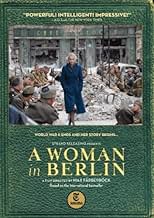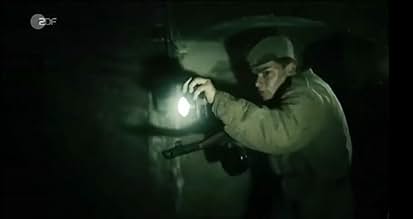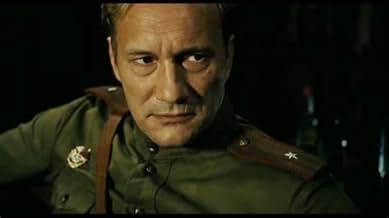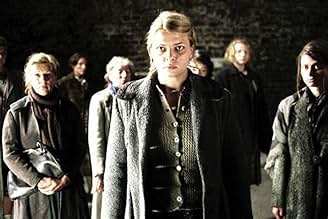CALIFICACIÓN DE IMDb
7.0/10
7.3 k
TU CALIFICACIÓN
Una mujer intenta sobrevivir a la invasión de Berlín por las tropas soviéticas durante los últimos días de la Segunda Guerra Mundial.Una mujer intenta sobrevivir a la invasión de Berlín por las tropas soviéticas durante los últimos días de la Segunda Guerra Mundial.Una mujer intenta sobrevivir a la invasión de Berlín por las tropas soviéticas durante los últimos días de la Segunda Guerra Mundial.
- Dirección
- Guionistas
- Elenco
- Premios
- 1 premio ganado y 4 nominaciones en total
Evgeniy Sidikhin
- Major Andreij Rybkin
- (as Evgeny Sidikhin)
Viktor Zhalsanov
- asiatischer Rotarmist
- (as Victor Zhalsanov)
- Dirección
- Guionistas
- Todo el elenco y el equipo
- Producción, taquilla y más en IMDbPro
Opiniones destacadas
A Woman in Berlin (2008)
Imagine the horrors of women caught in a large city during the chaos of war, with occupying troops storming your apartment building day after day. Well, think again. It isn't imaginable. I think even people who live through such things (and we are talking Berlin, 1945 for this movie) the truth is something that is pushed away. Because even watching a movie--a movie!--of these events is unbearable.
Not that the movie is unwatchable. Just the opposite. It's beautifully made, seeming to parallel that other recent German movie about the last days of the Nazi reign, "Downfall," 2004. But unlike that movie, this isn't about political history, or the history of war, or even the dramatization of historical figures as real people. This is a personal story, centering around one woman played by Nina Hoss, and about the repeated rape and abuse of women by the Russian troops for days and weeks on end. There was no escape, no power to complain to, no justice anywhere, anywhere, not German or Russian or even American (assuming they were any better) a mile or two away.
The movie is based on a book, "Anonyma," by a woman whose identity is not revealed, if it is even known (this was her protection even after death). The movie suffers now and then from a sameness, a steady pounding, beginning to end. The parade of horrors is continuous even as relationships develop and the first wave of anarchistic occupiers shifts to more entrenched troops and some general partying. You do cling to some semblance of progression, or of events to stand out from the others, but it's mostly about horribleness.
But maybe that's the way it should be. It was an endless nightmare on every level, even if you (they, these women) survive. In some ways, the end of the war is more believably insane here than in "Downfall" even though they are in many ways comparable movies, comparable moments. Such an array or gritty, believable acting and sets you won't find often. And thankfully, even the sentimental aspects are handled without swelling music and other cinematic tricks found too often this side of the Atlantic.
One last point, whatever you think of the Germans and WWII, here is yet another kind of national acknowledgment and, for many, soul-searching. This is a German film. The Russians don't come off great, for sure, but the Germans are clearly at fault, and are shown that way, and shown as responsible for even greater crimes. There's no glossing over any of it. Watch this movie. It won't be fun, but it'll be stirring and important.
Imagine the horrors of women caught in a large city during the chaos of war, with occupying troops storming your apartment building day after day. Well, think again. It isn't imaginable. I think even people who live through such things (and we are talking Berlin, 1945 for this movie) the truth is something that is pushed away. Because even watching a movie--a movie!--of these events is unbearable.
Not that the movie is unwatchable. Just the opposite. It's beautifully made, seeming to parallel that other recent German movie about the last days of the Nazi reign, "Downfall," 2004. But unlike that movie, this isn't about political history, or the history of war, or even the dramatization of historical figures as real people. This is a personal story, centering around one woman played by Nina Hoss, and about the repeated rape and abuse of women by the Russian troops for days and weeks on end. There was no escape, no power to complain to, no justice anywhere, anywhere, not German or Russian or even American (assuming they were any better) a mile or two away.
The movie is based on a book, "Anonyma," by a woman whose identity is not revealed, if it is even known (this was her protection even after death). The movie suffers now and then from a sameness, a steady pounding, beginning to end. The parade of horrors is continuous even as relationships develop and the first wave of anarchistic occupiers shifts to more entrenched troops and some general partying. You do cling to some semblance of progression, or of events to stand out from the others, but it's mostly about horribleness.
But maybe that's the way it should be. It was an endless nightmare on every level, even if you (they, these women) survive. In some ways, the end of the war is more believably insane here than in "Downfall" even though they are in many ways comparable movies, comparable moments. Such an array or gritty, believable acting and sets you won't find often. And thankfully, even the sentimental aspects are handled without swelling music and other cinematic tricks found too often this side of the Atlantic.
One last point, whatever you think of the Germans and WWII, here is yet another kind of national acknowledgment and, for many, soul-searching. This is a German film. The Russians don't come off great, for sure, but the Germans are clearly at fault, and are shown that way, and shown as responsible for even greater crimes. There's no glossing over any of it. Watch this movie. It won't be fun, but it'll be stirring and important.
10hasosch
Max Färberböck, known to the world-wide audience since his "Aimee and Jaguar", shows in this newer film for once not the standard story of the bad Germans, who, deserving after what they have done, being Nazis, are liberated by the good Russians, the good Americans and the good Allies. It shows exactly the same experience that we all, who grew up in the East Block, had about our Russiand "friends". They came to rape, to destroy, to violate, to erase. It is a very interesting fact concerning mass psychology or perhaps better mass-psychosis that nobody normally speaks about the enormous amount of destruction done or caused by the liberators of end-World War II Europe. And nobody even mentions the Stalinist concentration camps. This is why we need films like "Eine Frau In Berlin".
However, in Färberböcks film, we see the Russians, "like animals, like pigs, an-alphabets, without culture" - as the Russian Major says it in his own words, he, who speaks, according to the main female character "a seldomly high-style Russian". Well, a little bit of "justness" had to be - not ALL Russians are like the "scum" (quotation from the movie) that we see. Interestingly, my Hungarian home-town had been bombed by Americans, but afterward the Russians came like vultures and pitched themselves into the ruins, what was female, was raped, what had been church or synagogue - was emptied and the treasures stolen, a subculture sneaking from the sou-terrain up to the ruins and even profiting from corpses and debris.
However, in Färberböcks film, we see the Russians, "like animals, like pigs, an-alphabets, without culture" - as the Russian Major says it in his own words, he, who speaks, according to the main female character "a seldomly high-style Russian". Well, a little bit of "justness" had to be - not ALL Russians are like the "scum" (quotation from the movie) that we see. Interestingly, my Hungarian home-town had been bombed by Americans, but afterward the Russians came like vultures and pitched themselves into the ruins, what was female, was raped, what had been church or synagogue - was emptied and the treasures stolen, a subculture sneaking from the sou-terrain up to the ruins and even profiting from corpses and debris.
Although I was aware of the awesomeness of German cinema in the past decades, I was still pleasantly surprised by this film. The title of the movie implies a specific point of view - the plight of a woman trapped in Berlin during the last days of WW2. The movie is however far less black-and-white (metaphorically speaking, of course) than it could have been. It goes beyond a simplistic right/wrong attitude and instead puts the audience in a position to ponder how in a war atrocities escalate and feed on themselves in a typical "chicken and egg" problem. Even the fact that the book on which the movie is based was met with outrage when it was first published in the 50's is ultimately part of this chain.
There are more complex answers to why horrible things happen in a war, and in the world in general - and Europe has had its share of it - and this film manages to capture these complexities masterfully.
There are more complex answers to why horrible things happen in a war, and in the world in general - and Europe has had its share of it - and this film manages to capture these complexities masterfully.
Anonyma - Eine Frau in Berlin – A Woman in Berlin - CATCH IT (B+) A Woman in Berlin (German: Eine Frau in Berlin) is an autobiographical account of the period from 20 April to 22 June 1945 in Berlin (Battle of Berlin). At the author's request, the work was published anonymously for her protection. The book purports to detail the writer's experiences as a rape victim during the Red Army occupation of the city. Two years after her death in 2003 the anonymous author was identified in the Süddeutsche Zeitung by Jens Bisky (a German literary editor) as Marta Hillers. (Wiki) The controversial German movie is about the women who survived the war by working as captivate prostitutes for the Russians. Just like every war all the men were killed and women were tortured and captured by the occupiers. The starting of the movie is really nice as how it shows how people have to go through and live through once Russians won over Germany. The women whose husbands were Nazi were bound to be raped and tortured by the occupiers. The performances by all the German actor and actresses and especially Nina Hoss, August Diehl & Evgeniy Sidikhin are admirable. Because the performances in these hard hitting movies makes you believe the situation. The beginning of the movie really good but the movie falls when they start showing the romance between German woman and the Red Army commander, it slowed down the phase. On the whole, A woman in Berlin is a really nice movie about the aftermaths of the War.
rape is the particular plight of women during war and acknowledged at long last as a war crime.The plight of German women at the end of WW II was especially awful as they had protection from no one. General Eisenhower who punished rape committed by his men with execution outside of Germany (first rape took place six hours after invasion of Normandy had begun)but as for German women all men had free hands as these women were all declared "willing". The Americans are the only ones to have gone through archives as for army rape in WW II however the one recent book existing is not allowed for publishing in the US because of the war in Iraq (!!)so exists in French version only. The French and the British have preferred to turn a blind eye to what was done by their soldiers towards German women let alone the Russians. It is very important that this film has been made at long last. Subject concerns all not just its victims let alone the children born out of the horrors. Bravo Germany.
¿Sabías que…?
- TriviaThe movie's source novel is the diary of an unnamed woman, called Anonyma, from April 29, 1945 to June 22, 1945.
- ErroresWhen Germany's surrender is announced, the Soviet troops start singing the "Alexandrov version" of their national anthem, adopted about a year earlier. That version had no lyrics until Stalin intervened, and the heavy fighting wouldn't have allowed the soldiers to learn them. They most likely sang the chorus of "The Internationale," an earlier, better-known version.
- ConexionesFeatured in History: Anonyma - Die Frauen von Berlin (2010)
Selecciones populares
Inicia sesión para calificar y agrega a la lista de videos para obtener recomendaciones personalizadas
- How long is A Woman in Berlin?Con tecnología de Alexa
Detalles
- Fecha de lanzamiento
- Países de origen
- Sitio oficial
- Idiomas
- También se conoce como
- Anónima - Una mujer en Berlín
- Locaciones de filmación
- Productoras
- Ver más créditos de la compañía en IMDbPro
Taquilla
- Total en EE. UU. y Canadá
- USD 294,014
- Fin de semana de estreno en EE. UU. y Canadá
- USD 12,439
- 19 jul 2009
- Total a nivel mundial
- USD 1,863,939
- Tiempo de ejecución2 horas 11 minutos
- Color
- Mezcla de sonido
- Relación de aspecto
- 2.35 : 1
Contribuir a esta página
Sugiere una edición o agrega el contenido que falta

Principales brechas de datos
By what name was Anonyma - Eine Frau in Berlin (2008) officially released in India in English?
Responda


































